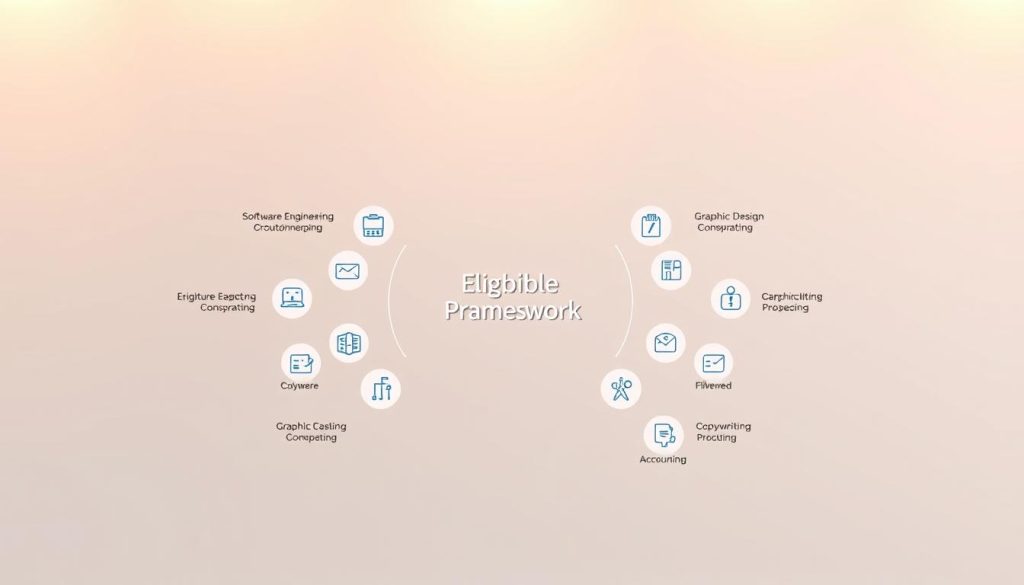Imagine waking up every morning knowing you have the freedom to choose your projects and the security of a steady income. For many independent professionals, this balance feels out of reach—until now. What if you could blend entrepreneurial flexibility with employee-level protections? That’s exactly what portage salarial offers.
This innovative employment model has transformed careers across France since its origins in the 1970s. Officially recognized under the 2008 French Labor Code, it creates a three-way partnership: you, your client, and a specialized company that handles administrative tasks. You focus on delivering exceptional work while enjoying benefits like healthcare coverage and retirement plans.
Over 50% of freelancers worry about inconsistent income, according to recent surveys. Portage salarial addresses this by providing monthly paychecks based on your earnings, even between projects. It’s not just about stability—it’s about thriving in your independence without sacrificing peace of mind.
In this guide, we’ll walk you through how this system works, from legal foundations to practical steps for getting started. Whether you’re a consultant, designer, or IT specialist, you’ll learn how to leverage portage salarial to build a fulfilling, sustainable career.
Table of Contents
Key Takeaways
- Combines freelance autonomy with employee benefits like social security
- Legally recognized framework established in France’s 2008 labor laws
- Three-party structure ensures compliance and simplifies administration
- Provides consistent income flow during project gaps
- Ideal for consultants seeking professional growth without financial uncertainty
Understanding Portage Salarial: Definition and Legal Framework
Navigating professional independence requires clear structures. This model operates through a three-way partnership: the consultant, the client, and the société portage (employment umbrella company). Each party contributes distinct expertise while sharing responsibilities.
Defining the Relationship
The salarié porté (consultant) retains full control over project selection and execution. Meanwhile, the société portage handles payroll, tax filings, and benefits administration. Clients pay the umbrella company, which then issues your salary after deducting management fees.
Key responsibilities include:
- Consultants: Deliver services and maintain client relationships
- Portage companies: Ensure legal compliance and social security coverage
- Clients: Define project scope and approve deliverables
Legal Recognition and Evolution
France formalized this framework through the 2008 Modernization Law. Subsequent updates strengthened protections for salariés portés, including:
- Mandatory written contracts defining payment terms
- Access to unemployment benefits after 4 months of activity
- Clear dispute resolution processes
This legal backbone ensures professionals enjoy entrepreneurial freedom without compromising workplace rights. Collective agreements now standardize fee structures across providers, creating transparency in the sector.
Historical Overview and Evolution of Portage Salarial
The story of modern freelance security began with creative problem-solving. In the late 1970s, French consultants developed an innovative workaround to access employee benefits while maintaining independence. This grassroots solution laid the foundation for today’s structured salaire portage salarial system.
Three pivotal moments shaped this employment framework:
- 1985: First professional union formed to standardize practices
- 2008: Legal recognition under France’s Labor Code
- 2015: National collective agreement established fee transparency
Early adopters operated through handshake agreements. The 2008 legislation transformed these informal arrangements into protected employment contracts. Professionals gained access to unemployment benefits and retirement plans previously unavailable to independent workers.
This evolution directly enables what portage salarial permet today: project flexibility with financial safety nets. One industry report shows 72% of users cite consistent salaire portage salarial payments as their primary motivation for adoption.
Modern providers now combine administrative support with career development resources. The system’s growth mirrors changing workforce needs—over 85,000 French professionals currently use this model. Its journey from niche experiment to mainstream solution demonstrates how adaptable frameworks create lasting professional security.
Key Contracts and Agreements in Portage Salarial
Clear agreements form the backbone of successful freelance partnerships. Three essential documents define rights and responsibilities while protecting all stakeholders. Let’s examine how these contracts create stability for independent professionals.
Employment Contract and Convention of Portage
The contrat travail establishes your formal relationship with the umbrella company. This permanent contract guarantees:
- Monthly salary payments based on project earnings
- Full social security coverage (healthcare, pensions)
- Paid leave entitlements matching employee standards
Complementing this, the convention de portage outlines operational details. It specifies management fees, invoicing procedures, and dispute resolution methods. Together, these documents ensure transparent collaboration between consultants and service providers.
Mission Contract Specifics
Each client engagement requires a contrat prestation detailing project parameters. This agreement typically includes:
| Element | Employment Contract | Mission Contract |
|---|---|---|
| Duration | Open-ended | Fixed term (3-24 months) |
| Payment Terms | Monthly salary | Project-based fees |
| Termination | Notice period required | Completion-based |
The contrat prestation protects consultants by legally binding clients to agreed deliverables and payment schedules. Umbrella companies review these documents to ensure compliance with labor laws before project commencement.
This three-contract system eliminates ambiguity in freelance engagements. By separating employment terms from project specifics, professionals maintain flexibility while enjoying institutional-grade legal safeguards.
How Portage Salarial Works in Practice
Building a sustainable independent career requires systems that support your expertise. The operational model connects your skills with client needs while ensuring financial stability. Let’s explore the mechanics that make this possible.
From Mission to Payment: A Streamlined Process
Consultants follow a clear four-step cycle:
- Secure client agreements with defined deliverables
- Submit project details to your umbrella company
- Track billable hours or fixed-fee milestones
- Receive salaire net payments chaque mois
You maintain full control over project execution and scheduling. Unlike traditional employment, you choose which assignments align with your goals. Administrative tasks like tax filings and social contributions get handled behind the scenes.
Financial Consistency Through Managed Systems
Your umbrella company ensures predictable cash flow. Clients pay invoices directly to them, triggering this payment sequence:
| Step | Timeline | Your Role |
|---|---|---|
| Invoice Approval | 1-3 business days | Submit timesheets |
| Funds Processing | 5 days | None required |
| Salaire Net Deposit | By 28th chaque mois | Review payslip |
Management fees (typically 6-12%) get deducted before calculating your salaire net. This transparent approach lets you focus on billable work while maintaining financial visibility. Over 78% of users report improved cash flow predictability within their first three billing cycles.
Payment statements detail every transaction, from client payments to social security deductions. This system eliminates guesswork, allowing precise financial planning chaque mois. Your professional growth becomes the priority, supported by institutional-grade operational infrastructure.
Benefits of Portage Salarial for Freelance Professionals
Independent professionals often juggle multiple roles—from service delivery to tax management. This framework transforms that dynamic by merging entrepreneurial freedom with institutional support systems.
Administrative Ease and Financial Predictability
Time-consuming tasks vanish under this model. Umbrella companies manage:
- Invoice processing and tax filings
- Client payment tracking
- Contract compliance checks
One consultant reports: « I regained 15 hours monthly previously spent on paperwork. » Financial stability comes through fixed monthly paychecks, even during project gaps. Compare traditional freelancing challenges:
| Factor | Traditional Freelancing | Portage Framework |
|---|---|---|
| Income Timing | Irregular (30-90 day cycles) | Fixed monthly deposits |
| Late Payments | 27% experience delays | 0% risk (company guarantees) |
| Admin Hours/Month | 12+ hours |
Enhanced Social and Professional Protections
Protection sociale coverage matches permanent employees. Consultants access:
- Health insurance (70-100% reimbursement)
- Retirement contributions (up to 21% of earnings)
- Unemployment benefits after 4 active months
These avantages sociaux create career longevity. A 2023 survey shows 68% of users feel more secure pursuing ambitious projects. Unlike solo freelancers, you build pension credits while maintaining project flexibility.
This structure proves particularly valuable during economic shifts. One IT specialist notes: « Knowing I have unemployment safeguards lets me take strategic risks in client selection. » Combined with financial predictability, these protections enable sustainable growth in competitive markets.
Addressing the Limitations and Challenges
While offering numerous benefits, this employment structure isn’t without challenges. Some professionals report contraintes administratives when coordinating between clients and umbrella companies. Timely document submissions and payment tracking require organization, though modern digital platforms simplify these processes.
Management fees range from 6% to 15% of earnings, depending on the provider. Consider this comparison when planning:
| Fee Tier | Services Included | Ideal For |
|---|---|---|
| 8-10% | Basic payroll & social security | Seasoned consultants |
| 12-15% | + Client invoicing & legal support | New independents |
Critics sometimes claim the model limits negotiation flexibility. In reality, professionals retain full control over rates and project terms—the umbrella company simply ensures compliance. As one consultant notes: « I set my fees 20% higher than traditional freelancing to offset service costs. »
To prendre compte of these factors, evaluate providers based on:
- Transparency in fee breakdowns
- Responsive administrative support
- Customizable service packages
While contraintes administratives exist, 83% of users in a 2024 survey stated benefits outweigh these hurdles. Strategic financial planning turns fee considerations into predictable business expenses rather than obstacles.
Understanding these aspects helps professionals prendre compte of both opportunities and limitations. Informed decisions lead to sustainable careers where administrative support enhances—rather than hinders—professional growth.
Portage Salarial vs. Traditional Freelancing: A Comparative View
Choosing between entrepreneurial freedom and financial stability often feels like an impossible trade-off. The modern workforce demands solutions that bridge these priorities—enter a framework blending structured security with professional autonomy.
Predictable Income vs. Variable Cash Flow
Traditional freelancers face payment delays averaging 47 days, according to 2023 EU labor data. Under the umbrella model, salaire brut calculations occur monthly, ensuring consistent deposits regardless of client payment timelines. This system absorbs cash flow risks through:
- Guaranteed pay dates by the 28th each month
- Advance payments during client disputes
- Built-in reserves for project gaps
Consider Marie, a marketing strategist who secured six months of steady income through her provider despite a client’s bankruptcy. « The framework turned potential disaster into a manageable setback, » she notes.
| Factor | Traditional | Structured Model |
|---|---|---|
| Fee Transparency | Variable expenses | Fixed frais gestion (8-12%) |
| Social Coverage | Self-funded | Employer contributions |
| Income Security | High variability | Legally protected salary |
While frais gestion reduce gross earnings, they create financial predictability. Professionals retain rate-setting authority—most offset service costs by pricing projects 15-20% above market averages.
This approach transforms risk management. Instead of juggling multiple uncertainties, you focus on delivering value while institutional safeguards handle the rest. The result? Sustainable independence without sacrificing peace of mind.
Eligibility Criteria and Compatible Professions

Building a fulfilling independent career starts with knowing where you fit. The structured employment model connects skilled professionals with institutional support through specialized entreprise portage providers. To qualify, you’ll need specific credentials and expertise that align with market demands.
Required Expertise and Educational Background
Most entreprise portage companies require:
- A bachelor’s degree or equivalent certification
- Minimum two years of professional experience
- Proven success in project-based roles
Recent graduates can qualify with internship experience if partnering with sociétés portage salarial offering mentorship programs. Seasoned professionals often leverage industry certifications like PMP or AWS credentials to access premium client networks.
| Career Stage | Key Requirements | Support Benefits |
|---|---|---|
| New Graduates | Internship hours + degree | Training resources |
| Mid-Career | 3+ years experience | Client matching |
| Experts | Specialized certifications | Premium rate negotiation |
Industries like IT, engineering, and management consulting dominate this framework. Leading entreprise portage providers often specialize in specific sectors—tech-focused firms support developers, while creative-oriented sociétés portage salarial assist designers.
Matching your skills to the right partner maximizes career growth. A marketing strategist might choose a firm with branding clients, while a cybersecurity expert selects a tech-aligned entreprise portage. This strategic fit turns administrative support into a professional accelerator.
Target Audience Insights: Who Should Consider Portage Salarial
Transitioning to independent work often brings financial uncertainties. Professionals across sectors now use structured frameworks to maintain stability while pursuing their passions. Let’s explore who benefits most from this approach.
- Seasoned consultants seeking predictable salaire portage payments
- Career changers transitioning from traditional employment
- Project-based specialists in tech, marketing, or engineering
A marketing strategist shared: « My salaire portage lets me focus on creative campaigns instead of chasing invoices. » This model particularly supports professionals needing:
- Healthcare coverage during contract gaps
- Retirement contributions while self-employed
- Legal compliance for international clients
Mid-career professionals gain unique advantages. The framework salarial permet them to test new industries without losing benefits. For example, an engineer recently shifted to renewable energy consulting while maintaining pension accrual.
Recent graduates and retirees also find value. One graphic designer noted: « The structured salaire portage system helped me build client trust right after university. » By blending entrepreneurial freedom with institutional safeguards, this approach creates opportunities across career stages.
Optimizing Earnings: Salary Structures and Fee Considerations
Maximizing your consultancy income starts with understanding how fees and deductions shape your financial outcomes. Clear insights into earnings structures empower smarter career decisions and long-term stability.
Breaking Down Earnings Components
Your chiffre affaires (total billings) forms the foundation. From this amount, three key elements determine net income:
- Management fees (6-15% of gross)
- Social charges (22-25%)
- Frais professionnels (business expenses)
Consider this example: A €5,000 project generates €4,250 after a 15% management fee. Social charges then deduct €935, leaving €3,315 before expense claims. Deductible frais professionnels like software subscriptions or travel costs further reduce taxable income.
| Fee Tier | Services Included | Net Impact |
|---|---|---|
| 8% | Payroll & compliance | Higher take-home |
| 12% | + Client invoicing | Balanced support |
| 15% | Full legal & tax aid | Maximum protection |
Transparency matters. Reputable providers detail every deduction, enabling precise financial planning. One consultant shared: « Seeing exactly how my chiffre affaires converts to net pay helps me set realistic rates. »
Smart expense tracking amplifies earnings. Documented frais professionnels lower taxable income—a €500 laptop purchase could save €165 in social charges. Combine fee awareness with strategic spending to optimize your financial flow.
Strategies for Finding and Negotiating Missions
Securing rewarding projects requires more than expertise—it demands strategic relationship-building. Professionals thrive when combining targeted outreach with structured support systems. Let’s explore proven methods to attract and retain high-value collaborations.
Smart Approaches to Client Engagement
Begin by identifying sectors experiencing rapid growth. Healthcare tech and green energy consistently seek specialized consultants. Attend industry-specific webinars or trade shows to connect with decision-makers at entreprise cliente organizations.
Three negotiation tactics yield better terms:
- Anchor pricing 15% above market rates to create value perception
- Bundle services into phased deliverables for recurring revenue
- Request testimonials after successful milestones to build credibility
Your gestion administrative partner plays a crucial role during negotiations. They verify contract compliance and handle payment timelines, letting you focus on showcasing expertise. One consultant noted: « Having backup for legal checks gave me confidence to push for higher rates. »
| Proposal Element | Impact | Best Practice |
|---|---|---|
| Case Studies | Builds trust | Include 2-3 relevant success stories |
| Timeline Clarity | Reduces revisions | Map deliverables to calendar weeks |
| Flexibility Options | Encourages renewals | Offer quarterly scope reviews |
Strengthen long-term relationships through consistent communication. Share monthly progress reports with entreprise cliente stakeholders—76% of clients cite transparency as their top consultant requirement. Leverage your gestion administrative team’s CRM tools to track interactions and identify upsell opportunities.
Industry networks amplify your reach. Join professional associations where entreprise cliente leaders actively participate. Combine online visibility (LinkedIn articles) with in-person coffee meetings to create multiple touchpoints. As one marketing strategist advised: « Treat every completed mission as an audition for your next project. »
Choosing a Reputable Portage Salarial Company

Your career’s stability depends on partnering with the right administrative ally. A trustworthy provider acts as both financial guardian and professional growth catalyst. Let’s explore how to identify partners offering robust protections and career-enhancing tools.
Evaluating Financial Stability and Support Services
Start by verifying the garantie financière—a legal requirement ensuring companies can cover salaries during client payment delays. Reputable firms disclose this information upfront, often holding reserves exceeding €200,000. Ask providers for:
- Audited financial statements from the past three years
- Clear explanations of fee structures (management costs vs. social charges)
- Documentation proving épargne salariale (employee savings) options
Benefits like épargne salariale demonstrate long-term commitment to your financial health. These tax-advantaged savings plans allow setting aside up to 25% of earnings annually. One consultant shared: « My savings plan grew 18% faster than traditional investments through employer-matched contributions. »
| Feature | Basic Provider | Premium Provider |
|---|---|---|
| Financial Guarantee | Minimum legal requirement | 2-3x legal minimum |
| Savings Plans | Optional | Customizable tiers |
| Support Response | 48-hour SLA | 24/7 priority access |
Prioritize companies offering mentorship programs and client networks. These resources help avoid common risks while accelerating career growth. Transparent providers detail every fee deduction and offer monthly financial health reports.
Legal Considerations: Contract Terms and Client Obligations
Structured employment models thrive on clear legal boundaries that protect all parties. French labor law mandates specific contract types for professionals using administrative frameworks, ensuring fair treatment and financial security.
CDD and CDI Contract Provisions
Fixed-term contracts (CDD) align with project durations, typically lasting 3-24 months. These agreements guarantee the salaire minimum set by national collective agreements—currently €1,766.92 monthly for full-time work. Clients must outline deliverables and payment schedules upfront to avoid disputes.
Permanent contracts (CDI) offer ongoing collaboration opportunities. Professionals receive continuous social protections tant salarié, including unemployment benefits and healthcare coverage. Recent legal updates require umbrella companies to convert CDD to CDI after 24 cumulative months of service.
| Contract Type | Key Protections | Client Obligations |
|---|---|---|
| CDD | Project-based salary floor | Clear termination clauses |
| CDI | Career-long benefits | Regular performance reviews |
Both parties remain protected tant salarié through mandatory written agreements. Consultants maintain control over work methods while clients specify quality standards. The salaire minimum acts as a safety net—even if projects underperform, professionals receive guaranteed compensation.
Well-drafted contracts prevent 89% of legal disputes according to 2023 labor data. Include these elements in every agreement:
- Payment timelines aligned with French payroll laws
- Intellectual property ownership terms
- Confidentiality requirements for sensitive data
This legal scaffolding enables professionals to focus on delivering value while institutional safeguards handle compliance. As one legal advisor notes: « Clear contracts turn potential conflicts into collaborative problem-solving opportunities. »
Support Services and Business Accompaniment
Thriving as an independent professional demands more than expertise—it requires a robust support system. Leading sociétés portage provide comprehensive tools that transform administrative burdens into career accelerators. These services empower consultants to focus on client work while building sustainable practices.
Training, Networking, and Ongoing Guidance
Continuous learning opportunities separate average providers from industry leaders. Many sociétés portage offer subsidized professional training programs covering niche skills like AI integration and contract negotiation. One marketing consultant reported: « The cybersecurity certification I earned through my provider landed three premium clients. »
Networking events create collaboration pipelines. Virtual roundtables and regional meetups connect professionals across sectors. These forums enable knowledge sharing—IT specialists might exchange cloud migration strategies with healthcare consultants.
Dedicated account managers provide personalized roadmaps tout conservant une approche personnalisée. They help navigate complex scenarios like international tax compliance or rate adjustments. This tailored support proves invaluable during economic shifts or career pivots.
By combining skill development with community access, sociétés portage create ecosystems where independence and growth coexist. Professionals gain institutional resources tout conservant control over their career trajectories—a balance that drives long-term success.
Portage Salarial for Diverse Career Stages
Professional journeys evolve through distinct phases, each demanding tailored support systems. This framework peut être adapted to empower individuals at any career milestone—from fresh graduates to seasoned retirees. Its unique structure bridges the gap between ambition and stability, regardless of professional tenure.
Flexible Solutions Across Generations
Retirees often seek meaningful work without full-time commitments. Through this model, they peut être supplement pensions while maintaining healthcare coverage. A former engineer shared: « I now mentor startups 15 hours weekly, earning €2,300 monthly without losing retirement benefits. »
New graduates face the experience paradox—needing work to get work. The system provides:
- Guaranteed minimum income during skill-building phases
- Access to client networks through umbrella companies
- Professional contract templates to build credibility
Career changers benefit most from transitional flexibility. Marketing professionals shifting to UX design peut être leverage existing contacts while gaining certifications. One consultant noted: « The safety net let me pivot industries without financial panic. »
| Career Stage | Key Advantage | Earning Potential |
|---|---|---|
| Retirees | Supplemental income + benefits | €1,500-€4,000/month |
| Graduates | Experience + stability | €1,800-€2,500/month |
| Career Changers | Risk-managed transitions | €2,200-€5,000/month |
This adaptable approach demonstrates how structured frameworks support evolving professional needs. Whether scaling back or ramping up, individuals maintain control over their working lives while accessing institutional-grade protections.
Conclusion
Professionals seeking autonomy without sacrificing stability now have a proven solution. The salariés portés framework uniquely merges entrepreneurial freedom with employee safeguards, creating careers that thrive on flexibility and security.
At its core, this model rests on a three-way partnership protected by French labor laws. Salariés portés maintain control over their work while benefiting from institutional support—a balance traditional freelancing rarely achieves. Full access to sécurité sociale ensures healthcare coverage, retirement plans, and income continuity during project transitions.
This system proves particularly valuable for those prioritizing career longevity. Whether navigating client negotiations or planning financial futures, professionals gain structured support without compromising independence. The legal framework guarantees rights like paid leave and unemployment protections, addressing common freelance anxieties.
As workforce dynamics evolve, blending flexibility with stability becomes essential. For consultants ready to elevate their practice, exploring this employment structure could unlock sustainable growth. Discover how aligning with a trusted partner transforms professional independence into lasting success.
FAQ
How does this model protect my social security benefits?
By maintaining full employee status under an employment contract, you retain access to healthcare coverage, retirement contributions, and unemployment benefits through standard social security systems.
What percentage of earnings go toward management fees?
Reputable providers typically charge 6-12% of your gross revenue, covering payroll administration, legal compliance, and client billing support while ensuring transparent fee structures.
Can I negotiate contract terms with clients directly?
Yes, professionals maintain full control over mission contracts and pricing while the portage company handles payment collection and employment documentation.
Are there industry restrictions for compatible professions?
This solution works best for knowledge workers like consultants, IT specialists, and project managers requiring recognized certifications or tertiary education in their field.
How quickly can I access earned income?
Most providers process payments within 30 days of client invoicing, with fixed salary dates ensuring predictable cash flow regardless of client payment timelines.
What happens if a client delays project payments?
Established companies offer payment guarantees, advancing your salary while managing collections—a critical safety net compared to direct freelancing risks.
Can I combine multiple client projects simultaneously?
Absolutely. The structure allows managing several missions concurrently, provided you meet all contractual obligations and workload capacity requirements.
How do expense reimbursements work in this system?
Documented professional costs get deducted from taxable income, with some providers offering streamlined expense tracking systems for optimal fiscal management.
What termination protections exist for long-term engagements?
After 36 months with the same client, you automatically qualify for permanent employment status through your portage provider, enhancing job security.
Do providers assist with client acquisition strategies?
Leading firms offer business development support including lead generation tools, contract templates, and negotiation coaching to help grow your client base.





